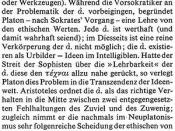According to Aristotle, virtue involves rationality and the use of a person?s rationality. Rationality and happiness are activities of the soul, and virtue is the excellence of these activities. Humans are the only life forms that have a soul, the source of rationality. Thus, humans have a duty to always use their intellect.
Three things are found in the soul: emotions, capacities, and characteristics. Emotions are things humans feel, like anguish or happiness that are followed by pain or pleasure. Capacities are a person?s ability or capacity to experience or express something. Since people are not considered good or bad based on their emotions, virtue cannot be an emotion. Virtue is not a capacity either, because virtue involves choice, not abilities. Therefore virtue is a characteristic of a person that ?renders good the thing itself of which it is the excellence and causes it to perform its functions well.?
In other words, a person with good character has virtue.
The aim of all human action is for good and any virtuous act is good. A virtuous act must be based on rationality and only acted on after careful deliberation by the individual. Therefore, a virtuous individual must be knowledgeable about what is good, must only make choices after careful deliberation, and must be a good judge of proper action. These virtuous characteristics come form experience, training, and environment conducive to learning, a love of rationality, and good habits developed from constant practice.
Aristotle reasoned that because humans base most of their decisions on the amount of happiness they bring, a moral principle must address the way pain and pleasure fits into our decision making process. Pleasure causes humans to do base actions. Pain keeps us from doing noble actions. Virtue involves maintaining a balance between pain...


